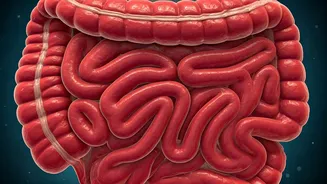Mindful Eating Practices
The first habit for gut health involves focusing on mindful eating. This entails being truly present during meals, savouring each bite and paying attention
to signals from your body. Slowing down while eating allows the digestive system to function more efficiently, reducing the likelihood of overeating and indigestion. Consider minimizing distractions such as television or your phone while eating. These distractions can cause you to mindlessly consume meals which can result in poor digestion. Taking the time to fully chew your food and appreciate its flavors also aids digestion and contributes to the overall gut health. Remember, conscious eating isn't just about what you eat, but also how you eat.
Hydrate, Hydrate, Hydrate
Staying hydrated is crucial for maintaining a healthy gut. Drinking adequate amounts of water helps in the breakdown and absorption of nutrients, and supports the efficient movement of food through your digestive tract. This can prevent constipation and ensure your digestive system functions smoothly. Aim to drink water consistently throughout the day, and consider carrying a water bottle to remind you to hydrate regularly. It is suggested that you drink water before your meals, as this can optimize the digestive process. Keeping hydrated is a cornerstone of gut health, promoting an environment where beneficial bacteria can flourish and your digestive processes can run effectively.
Prioritize Quality Sleep
Getting enough quality sleep is very important to gut health. During sleep, your body repairs and regulates many functions, including those of the digestive system. Poor sleep can disrupt the gut microbiome, leading to inflammation and digestive issues. Establish a regular sleep schedule, aiming for 7-9 hours of sleep each night. Create a relaxing bedtime routine to signal your body that it’s time to rest. Make sure to keep your room dark and quiet to get deep sleep. Ensuring proper sleep hygiene is an easy step towards a healthier gut and better overall health. When your body gets sufficient rest, the gut gets a chance to recover and rebuild, which allows it to function optimally.
Manage Daily Stress
Chronic stress has a negative effect on your gut health. High stress levels can disrupt the balance of gut bacteria, increasing inflammation and potentially worsening digestive issues. Find healthy ways to manage your stress, such as through yoga, meditation, or spending time in nature. Regular exercise is also effective, as it boosts your mood and reduces stress hormones. Incorporate relaxation techniques into your daily routine, such as deep breathing exercises or mindfulness practices, to calm your nervous system. By actively managing your stress, you support a healthy gut environment that is better equipped to handle everyday challenges.
Chew Food Thoroughly
The act of chewing food well before swallowing is a simple yet often overlooked habit that is extremely beneficial for the gut. Chewing breaks down food into smaller particles, making it easier for enzymes in your digestive system to break it down. This process reduces the burden on your stomach and intestines, promoting better nutrient absorption. Take your time while eating. Place your fork down between bites and focus on fully chewing each mouthful. This is not only supports good digestion, but it can also prevent overeating. Conscious chewing also helps to enhance the flavors of your food, making your meal more enjoyable and satisfying.
Consume Probiotic Foods
To foster a healthy gut, incorporate probiotic-rich foods into your diet. Probiotics are beneficial bacteria that promote a balanced gut microbiome, which is essential for proper digestion and immune function. Include foods like yogurt, kefir, sauerkraut, kimchi, and kombucha in your meals. When selecting these foods, look for varieties with live and active cultures. Probiotics can help reduce inflammation, improve digestion, and support overall gut health. Gradually increasing your intake of probiotic-rich foods can lead to noticeable improvements in your digestive well-being and general health.
Introduce Prebiotic Fiber
Prebiotics serve as the food for probiotics, playing a pivotal role in the gut health. They support the growth and activity of beneficial gut bacteria. Incorporate foods high in prebiotic fiber, like onions, garlic, bananas, oats, and apples, into your diet. These fibers are not digested by your body, but are fermented by the bacteria in your gut. This process supports a healthier gut environment. Regularly consuming prebiotic-rich foods can boost the population of good bacteria, enhancing digestion, improving nutrient absorption, and fortifying your immune system. Including these foods is a step towards nurturing a flourishing gut microbiome.
Regular Physical Activity
Regular exercise is beneficial for overall health and plays a key role in supporting the gut health. Physical activity promotes better digestion by stimulating the movement of food through your digestive tract and also reduces stress, which negatively affects gut health. Aim for at least 30 minutes of moderate-intensity exercise most days of the week, such as brisk walking, jogging, or cycling. Activities like yoga and Pilates can also have a positive impact. Exercise can increase the diversity of the gut microbiome and reduce inflammation. Maintaining an active lifestyle is a simple and effective strategy for promoting a healthier gut and improving overall well-being.
Limit Processed Foods
One of the most impactful habits to adopt for gut health is reducing the intake of processed foods. These foods often contain high levels of sugar, unhealthy fats, and additives that can disrupt the balance of your gut bacteria. Processed foods can lead to inflammation and increase the risk of digestive issues. Focus on consuming whole, unprocessed foods like fruits, vegetables, lean proteins, and whole grains. When purchasing packaged foods, carefully review ingredient lists, opting for items with minimal additives. By decreasing your consumption of processed foods and choosing natural, nutrient-dense alternatives, you can significantly enhance your gut health and overall well-being.
Create Weekly Gut Plan
Implementing a weekly gut-care plan can help you systematically integrate these habits into your life. Plan your meals and snacks to include probiotic and prebiotic-rich foods. Dedicate specific times for exercise and relaxation. Schedule your sleep and set up a consistent bedtime routine. Consider setting reminders to stay hydrated throughout the day. Regularly review your progress, and adjust your routine as needed. Use a planner or a digital app to track your daily habits and note any improvements or challenges you may face. Tailoring a weekly plan ensures consistency, enabling you to build healthy habits and maintain a thriving gut microbiome. This also helps in the long run.












